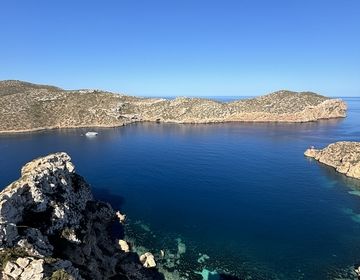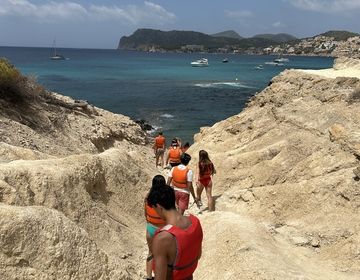A Morning Observing Modern Dinosaurs
When I hear "bird watching," my mind leaps towards camouflage clothing, giant cameras, and a general skulking about the woods. Watching the Global Navigators enthuse about the fluffy white little egret and guess which of the many duck species a particular gray waddler belonged to definitely cleared away that antiquated perception. And though we did, in fact, see a man in camo with a giant camera, we also saw how scientists are born through curiosity about the incredibly diverse world around us.

Students spent this past Friday morning at the Albufera Natural Park, identifying and recording the different birds that populate the area. This northern portion of Mallorca is filled with various wetland ecosystems, and students had the pleasure of listening to the flow of natural waterways and the birds that live around them. Albufera is the biggest wetland of Mallorca, but a person might not guess this when looking at many areas of hard packed dirt revealed by the current heat wave. The yellowed roots visible between the green leaves of wetland plants and the cracked earth below would have been eerie, if not for the brilliant children who spotted life faster than I could keep up with. The binoculars passed down the line as students took notes and debated bird types. A navigator with an eye for animal behavior saw an odd hopping and correctly predicted a bird was about to poop! It was hilarious, but also incredibly impressive.
Science is not always glamorous, and though the observations students recorded will be used in future data collection in Albufera, those observations came at the cost of comfort. This too, Bea pointed out, was a fundamental part of the experience. Every luxury we have derived from ecological research, whether that be common pharmaceuticals (like aspirin and caffeine!), or knowledge about the vast and incredible animal kingdom, comes at the cost of scientific researchers trekking through the richest, and most challenging, parts of the world around us. Still, a seasoned scientist doesn't become seasoned within two weeks of a summer abroad program...

There was only a very small information center. As the heat bore down on our group, students were ready to escape back to the bus. We trudged back up the long drive into the park, but students still cheerfully chatted about the birds, about lots of other things too, but about the fascinating features and flights of birds.
Related Posts
A Day of Discovery: Exploring Cabrera
On Wednesday, July 24th, our Marine Ecosystems and Sustainability program participants embarked on an unforgettable excursion to the island of Cabrera, a pristine gem off the east coast of Mallorca... keep reading
A Day at Cala Romana
We’re excited to share what an amazing day we had here in Palma de Mallorca! Today was all about discovering the wonders of Cala Romana, a beautiful coastal gem that... keep reading
Alcudia Adventures!
This week, our CIEE students embarked on an unforgettable journey to Alcudia. The adventure began with a double-decker bus ride, stopping at the Parc natural de sa’albufera for a unique... keep reading





















